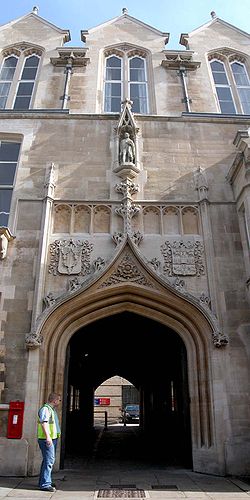This article contains promotional content .(April 2025) |

Old Cavendish Laboratory,
Free School Lane

The Faculty of Human, Social, and Political Science at the University of Cambridge was created in 2011 out of a merger of the Faculty of Archaeology and Anthropology and the Faculty of Politics, Psychology, Sociology and International Studies. According to the Cambridge HSPS website: graduates pursue careers in "research (both academic and policy research), the Civil Service (including the Foreign Office), journalism, management consultancy, museums, conservation and heritage management, national and international NGOs and development agencies, the Law, teaching, publishing, health management, and public relations." [1]
Contents
- Selected members of the Faculty
- University and College Teaching Officers in the HSPS Faculty
- Members of the Faculty elsewhere in the University
- Teaching
- Applications
- Notable alumni
- References
The Faculty houses four departments: the Department of Archaeology, [2] the Department of Social Anthropology, [3] the Department of Politics and International Studies [4] and the Department of Sociology. [5] Each of these departments has a worldwide reputation for teaching and research, and the undergraduate curriculum (Tripos) is designed to serve not only students who have clear disciplinary commitments at the time of application but also those who want broader multidisciplinary degrees. Students with a passion for politics can take advantage of links with such departments as Economics and History, those with interests in Sociology can draw on Anthropology and Geography, while those dedicated to pursuing an archaeology career can specialise from the first year or combine Archaeology with Biological and Social Anthropology.
Undergraduate students study several disciplines in their first year and then specialise in one or two disciplines in their second and third years. Clearly specified tracks (Archaeology, Biological Anthropology, Politics, Psychology, Social Anthropology, Sociology, or a combination of disciplines) ensure that students graduate with appropriate intellectual and professional skills. Assyriology and Egyptology are also possible specialisations within the Archaeology track.
At the postgraduate level there are established one-year MPhils in Archaeology (including Assyriology and Egyptology), Biological Anthropology, International Studies, Social Anthropology, and Sociology. The sociology MPhil allows for specialisation in one of four areas: reproduction (now ended); political economy; marginality and exclusion; and media and culture. A new MPhil in Politics was launched in 2008.
For further postgraduate study PhD students conduct research within a wide range of subjects within Archaeology, Assyriology, Egyptology, Biological and Social Anthropology, Politics and International Studies, and Sociology.
The Faculty is currently spread across several sites. The SPS Library (now affiliated with the University Library) and the Department of Sociology are on Free School Lane at the New Museums Site. The Department of Politics and International Studies is in the Alison Richard Building on the Sidgwick Site. The Department of Archaeology and Anthropology is spread across the Downing Site, the New Museums Site and the Henry Wellcome Building.
